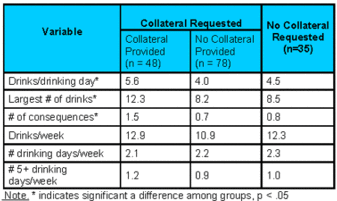The WAGER Vol. 9(29) – Truth, Lies and Collateral Informants
Special Note: This week’s WAGER was co-authored by Alexa Rubenstein, a summer intern at the Division on Addictions. She will be a sophomore at Harvard University next fall, where she is concentrating in psychology.
Country singer Glenn Campbell recently explained his November DUI conviction for “extreme drunk driving,” by claiming that he “wasn’t really that drunk,” “just over-served” (Desert Morning News, 2004). Such seemingly inconsistent descriptions of one’s behavior are not uncommon. Inaccurate memory, cognitive biases, or attempting to give a socially desirable response can affect self-report such as Campbell’s. Unfortunately, in the absence of an independent gold standard, self-report measures of behavior comprise much of the knowledge base in the field of addictions. To combat self-report errors, some researchers ask respondents for a collateral informant. Informants can serve as a validity check for subjects’ self-reports and encourage subjects to be more truthful with their responses in light of the possibility of a collateral contradiction. However, their inclusion might also discourage some subjects from participating in research and raise attrition rates. This week’s WAGER reports on a study by Cunningham, Wild and Cordingley (2004) that attempted to better understand the impact of using collateral informants on subjects’ attrition and self-reports of alcohol use.
Cunningham et al.’s study of collateral informants was embedded in a larger study evaluating the efficacy of self-help materials for problem drinkers (see Cunningham, Koski-Jaennes, Wild, & Cordingley, 2002, for details). Researchers randomly assigned subjects to one of three collateral conditions: (1) asked to provide a collateral informant; (2) asked to provide a collateral informant and told that the there was a 50% chance that the collateral informant would be contacted; (3) not asked to provide a collateral informant. Study subjects completed a questionnaire at baseline and six months after receiving the self-help materials. Collateral requests were made at the six month follow-up. Subjects could refuse to comply with the request. The questionnaire for both baseline and follow-up consisted of the Alcohol Use Disorders Identification Test (AUDIT) and several other questions concerning alcohol use. The current study reported results from the follow-up questionnaire.
Of the 204 subjects followed up, 161 (79%) completed the mailed follow-up questionnaire. Contrary to the authors’ hypothesis, request for a collateral informant did not significantly affect attrition rates, .2(2) = 2.1, p = >.30. The attrition rate was lowest among subjects who were asked to provide a collateral informant (15%) and highest among those who were not asked (27%).
The authors observed an effect of actually providing a collateral informant on self-report variables. For this analysis, Cunningham et al. compared (a) subjects in either collateral condition (i.e., collateral request or collateral request indicating 50% chance of contact) who identified a collateral informant to (b) those in either collateral condition who refused to identify a collateral informant to (c) those who were not asked to provide a collateral informant. The results are displayed in Table 1.
Table 1. Drinking behaviors for subjects grouped by request for and provision of a collateral informant (Cunningham et al., 2004)
The groups differed significantly on their reported number of drinks per day, F(2,152) = 3.8, p < .03, largest number of drinks consumed at one time, F(2,152) = 4.9, p < .05, and consequences of their drinking, F(2,152) = 4.5, p < .02. Post-hoc tests revealed that the subjects who provided a collateral informant reported having more drinks per day, consuming a larger amount of alcohol on one occasion, and receiving more consequences from their drinking than subjects who refused to provide a collateral informant. The collateral providers also reported consuming a larger amount of alcohol on one occasion than did subjects who were not asked to provide an informant.
The results of this study indicate that providing a collateral informant does not increase attrition rates and might affect subjects’ self-report. However, there are a few limitations to these results. A majority (62%) of the 126 subjects who completed the follow-up and were asked to identify a collateral informant refused to identify one. There might be important differences between people willing and not willing to provide a collateral informant that could include differences in reported or actual drinking behaviors. From these results alone, we cannot differentiate between three alternative explanations for these results: (1) subjects who provided collaterals were more accurate in their reports or (2) subjects who drank more also were more likely to provide a collateral informant or (3) subjects who provided collaterals over-reported their drinking.
Despite these caveats, this study provides evidence that requesting collateral information does not reduce participation and does increase the amount of alcohol use reported by subjects. Because self-report is likely to remain the primary source of data for studies on addictive behaviors in the foreseeable future, precautions taken to bolster the validity of self-reports are necessary to ensure that the knowledge gained is as accurate as possible. Although this study and others like it demonstrate only that participants increasingly report negative behavior when procedures include collateral informants, we can speculate that participants provide less socially desirable and more truthful responses when confronted with the potential of a confirmatory source.
Comments on this article can be addressed to Alexa Rubenstein or Rachel Kidman.
References
Cunningham, J. A., Koski-Jaennes, A., Wild, T. C., & Cordingley, J. (2002). Treating alcohol problems with self-help materials: A population study. Journal of Studies on Alcohol, 63, 649-654.
Cunningham, J. A., Wild, C., & Cordingley, J. (2004). Using collaterals to validate self-reports of problem drinkers: Any impact on client attrition and quantity of drinking reported. Addictive Behaviors, 29, 615-621.
Desert Morning News. (2004, July 2). Campbell "overserved" before his DUI arrest. Desert Morning News.
